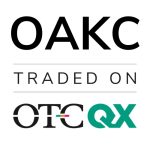- What is OTCQX?
OTC Markets Group Inc. (OTC) operates regulated markets for trading securities more efficiently using electronic networks that allow two parties to trade directly with each other using a broker-dealer as an intermediary. OTC is not an exchange like Nasdaq or NYSE, which operate as highly efficient auction markets.
- I’ve heard of “over the counter” and “pink sheets.” Is this the same thing?
There are three public markets operated by OTC. Oakworth will trade under the symbol OAKC on the OTCQX Best Market which requires high financial standards, best practice corporate governance and demonstrated compliance with applicable securities laws for trading.
- What does this mean for me as a shareholder?
The OTC platform is a more efficient way for you to buy and sell Oakworth shares. You should be able to transact the stock through most brokers as opposed to having to locate a willing buyer/seller on your own. Our stock will also have additional visibility that could increase its liquidity (i.e., readily available buyers/sellers at any given time), although there are no guarantees. Please see below for an additional explanation of liquidity.
- I am currently an Oakworth shareholder; how do I sell my shares?
The easiest and most efficient way to facilitate a sale of your shares is to first move your shares into an OTC-participating brokerage account. (See FAQ #6 below) Your broker will then be able to locate buyer(s), post your order in the OTC market place or otherwise facilitate liquidity in an attempt to sell your shares.
However, if you choose not to sell your shares through a broker, you will need to locate a willing buyer on your own. Please note that Oakworth is prohibited from doing this for you. If you do in fact choose to facilitate your own sale(s), you will need to contact Computershare to initiate a transfer process. Please also note that in some instances, shareholders who attempt to sell their own securities without the use of a broker, may require an attorney. Fees may apply when executing the trade in either instance.
https://www.otcmarkets.com/otc-link/broker-dealer-directory
- If I want to purchase [additional] shares of Oakworth, how do I go about doing so?
The easiest and most efficient way to purchase Oakworth shares is to first open an account at an OTC-participating broker. (See FAQ #6 below). Your broker will then be able to locate seller(s), post your order in the OTC market place or otherwise facilitate liquidity in an attempt to complete your purchase.
However, as outlined above in FAQ #4, you may also choose to locate sellers on your own. In this instance, you would again need to contact Computershare and potentially an attorney to assist in the transfer process. Fees may apply when executing the trade in either instance.
- Can Oakworth act as my broker?
No. Oakworth is not a registered broker-dealer. To help streamline this process for you, we have partnered with Stifel Financial Corp. Stifel is also able to directly access the OTC market place and is very familiar with our company. We would encourage current or prospective shareholders seeking an opportunity to transact in OAKC shares, to contact us at or 205-263-4700 for more information.
- How does BancList fit into this?
BancList will sunset as a platform for locating buyers and sellers of Oakworth.
- Is Oakworth publicly traded now?
Companies that trade via OTC are considered public but unlisted. The governing rules and regulations are not the same as what is typically described as a public company.
- What does “over the counter” mean?
See above. We are not traded on a nationally recognized exchange. OTC serves as a platform for brokers to use to identify buyers and sellers for their clients. Our shares are made available for “over the counter” trading between brokers using technology to facilitate.
- Will there be more liquidity in the stock on OTCQX?
OTCQX makes information on the stock, including Real-Time Level 2 quotes, available via their site. The potential pool of buyers is bigger with broker-dealers able to access the stock and with OTC having its own list of potentially interested parties. However, the market for smaller market cap stocks is limited, and a listing on OTCQX does not typically result in significant changes in demand.
- Why am I being encouraged to move my certificates to book entry and what does that mean?
“Book entry” simply means your shares are held electronically instead of on physical paper certificates. Most shares held in a brokerage account are book entry. Two very important reasons we encourage shareholders to exchange certificates into book entry are (1) the ease of trading electronically and (2) protection from loss of paper certificates. Did you know that a lost certificate cannot be replaced without the purchase of a bond to protect against the certificate resurfacing and being presented for sale or transfer? This cost is often 3% of the total value of the certificate.
- How do I move my shares into book entry?
Please contact Computershare for information needed.
- Are there fees associated with transactions?
You will be subject to your typical broker-dealer transaction fees or customary transfer agent transaction fees. In the instance of a lost certificate, this includes the purchase of a bond (See FAQ #11 above) for certificate replacement prior to trading.



